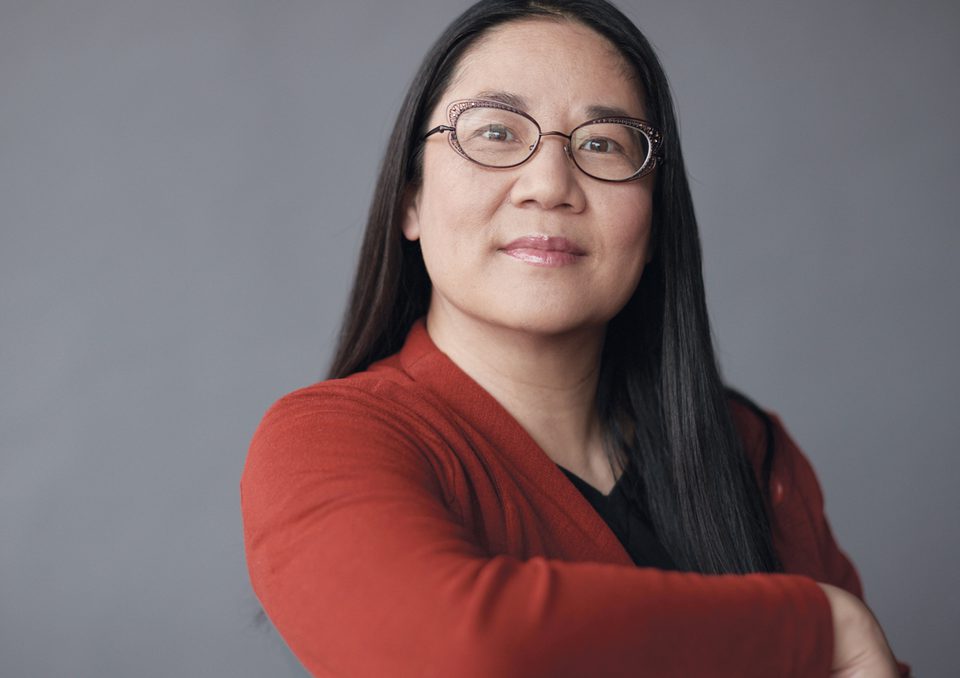Dr. Judy Chang: Research aims to help domestic violence survivors during the pandemic

During the early days of the COVID-19 pandemic, as Dr. Judy Chang transitioned to telemedicine visits with her patients, there was one in particular who worried her.
The concerns actually began when they were still meeting in person: “She kept coming in with a wound that was not healing, even though it had been months since her surgery,” notes Dr. Chang, a gynecologist and investigator with Magee-Womens Research Institute.
The patient’s explanations were questionable; she said she fell, and her wound split open again as a result. And when the visits turned virtual, she gave just the ever-so-slightest cues that something was amiss.
“She was talking to me, and it seemed appropriate – kind of – but there was a little bit of a shadow over her face,” Dr. Chang says. The woman would shift her gaze up and be talking while looking in a different direction. “I’m wondering: ‘Who is she looking at?’”
The exchange worried Dr. Chang, a longtime advocate for survivors of intimate partner violence whose research has sought better, more effective interventions. Though she worried about COVID-19, she began pushing her patient to come for an in-person visit.
In a video call, “I can’t even ask if she’s alone and feel safe with that, or ‘Are you safe to talk?’ and feel safe with that. The only answer she can give is yes,” Dr. Chang says. “It really started to make me think: If this is a prolonged situation, how are we going to get information pushed out?”
So she turned to her frequent collaborator, Dr. Elizabeth Miller, director of the Division of Adolescent and Young Adult Medicine at UPMC Children’s Hospital of Pittsburgh, in hopes that they could work on solutions.
It turned out that they weren’t the only ones who saw red flags. Women who were connected to My Healthy Pregnancy, an application that debuted for expectant mothers in November 2019, were reporting concerns about relationship violence through the app.
“The question was: what’s the appropriate way to follow up,” says Miller, signaling that the findings from the COVID-19 research could prove useful in a variety of settings.
Dr. Maya Ragavan – a general pediatrician and investigator at Children’s who describes Drs. Chang and Miller as mentors -- was similarly worried about the possibility of a surge in domestic violence as more people were staying home, potentially in abusive situations.
Dr. Ragavan has long had a passion for gender equity; her great-aunt and her family developed a village-based advocacy program in India for domestic violence survivors, which her great-aunt still runs at age 94.
Drs. Ragavan, Chang and Miller, as well as Dr. Rachel Berger, division chief for child advocacy at Children’s, and Dr. Kimberly Randell, a pediatric emergency room physician at Children’s Mercy Hospital in Kansas City and associate professor of pediatrics at the University of Missouri-Kansas City, are now in the midst of a nine-month-long project funded by the Centers for Disease Control that seeks to understand and recommend best practices for victim service agencies, healthcare providers, policymakers, and others to support patients and their children who may be experiencing abuse during this pandemic, even if the visits are conducted remotely.
The team is collaborating with nonprofit groups to interview about 60 advocates who work with domestic violence survivors, as well as 5 or so stakeholders, including leaders of national organizations such as the American Academy of Pediatrics, Futures Without Violence, and national and state-based sexual assault and domestic violence coalitions. The plan is to produce recommendations that will serve a variety of audiences.
Already, about 12 interviews are complete, says Dr. Miller.
“We got a very, very robust response from advocates around the country,” she notes.
Their plan is to prepare best practices recommendations in time for the expected fall surge in COVID-19 cases, though already, their research is yielding new guidelines.
They helped coach leadership from UPMC Magee-Womens Hospital on how best to reach out to patients who used My Healthy Pregnancy to report problems, adapting an approach that Drs. Chang and Miller have used for years.
Rather than confronting the patient about their concerns, the provider speaks more universally: “A lot of people are under stress right now,” for example, and then offering a variety of resources that includes a domestic violence hotline, so it doesn’t stand out on its own.
Another idea that came from advocates is to ask a patient to say “Oh, you’re breaking up, let me move to get better cell signal ,” as a strategy for finding a more private location, then connect them through a three-way call to a women’s shelter if the patient is interested.
Building relationships with domestic violence resources in advance is key, notes Dr. Miller: “Clinicians absolutely need to know who their advocates are, how to make that connection, and then how to do it virtually.”
The team believes the recommendations will have a shelf life that lives long past the current pandemic.
“I don’t think we’re ever going to not have telemedicine,” says Dr. Miller. “It’s become a huge part of how we’re going to deliver health care moving forward.”
Be the First to Know
Get the latest research, news, events, and more delivered to your inbox.